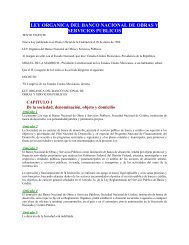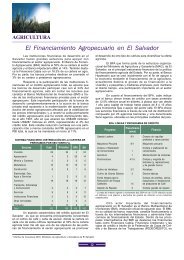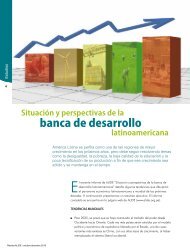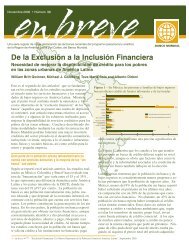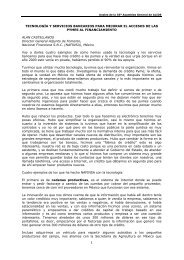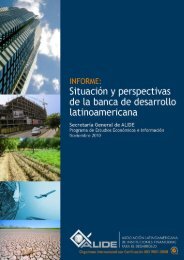After the Washington Consensus: Latin American Growth and ... - Alide
After the Washington Consensus: Latin American Growth and ... - Alide
After the Washington Consensus: Latin American Growth and ... - Alide
You also want an ePaper? Increase the reach of your titles
YUMPU automatically turns print PDFs into web optimized ePapers that Google loves.
<strong>After</strong> <strong>the</strong> <strong>Washington</strong><br />
<strong>Consensus</strong>:<br />
<strong>Latin</strong> <strong>American</strong> <strong>Growth</strong> <strong>and</strong><br />
Sustainable Development<br />
John Williamson<br />
Senior Fellow, Institute for<br />
International Economics
A Common View<br />
• <strong>Washington</strong> <strong>Consensus</strong> held sway in early<br />
1990s<br />
• <strong>Growth</strong> revival was modest<br />
• Then <strong>the</strong>re was ano<strong>the</strong>r lost half-decade<br />
• And <strong>the</strong>n <strong>the</strong> voters moved left<br />
• Result: A New Dawn? Or Continued<br />
Failure?
Ano<strong>the</strong>r View<br />
• At least 5 of <strong>Latin</strong> America’s 7 large<br />
countries are now committed to macro<br />
prudence
Ano<strong>the</strong>r View
Ano<strong>the</strong>r View<br />
• At least 5 of <strong>Latin</strong> America’s 7 large<br />
countries are now committed to macro<br />
prudence<br />
• Little policy reversion<br />
• Less liberalization in part because<br />
economies are now less dirigiste<br />
• No expectation of finding simple solutions<br />
to complex problems
The Macroeconomic Agenda<br />
• Past crises, so crisis prevention needs to be a<br />
priority<br />
• Macro policy focused more on preserving sound<br />
fundamentals <strong>and</strong> less on S-R growth<br />
maximization will actually increase L-R growth:<br />
– Counter-cyclical fiscal policy<br />
– High reserves <strong>and</strong>/or stabilization fund in good times<br />
– Relatively flexible exchange rate<br />
– Avoid currency mismatches<br />
– Borrow in growth-linked bonds
Brazil<br />
• Less likelihood of a new round of crises due to<br />
prudent policies (primary surplus, c/a surplus)<br />
• But needed monetary tightening overshot:<br />
– <strong>Growth</strong> slowdown<br />
– Debt/GDP ratio<br />
– Appreciation of real<br />
– Lower investment<br />
• Remember Greenspan 1996-98!<br />
– Continue cutting interest rate, even if cautiously
The Microeconomic Agenda<br />
• The major determinant of L-R growth:<br />
– Whe<strong>the</strong>r business has a chance to succeed, in conditions where its<br />
success aids society<br />
• The old issue: state versus market<br />
• Good news: markets already <strong>the</strong>re<br />
• Bad news: public hostility to market<br />
• Needs politicians prepared to brave <strong>the</strong> electoral<br />
consequences of pro-market reforms
Priorities<br />
• Technology:<br />
– Industrial policies no, national innovation<br />
strategies yes<br />
• Labor markets in <strong>the</strong> formal sector<br />
• Establishing new formal enterprises<br />
• Property rights in <strong>the</strong> informal sector<br />
• Corporate social responsibility
Institutions<br />
• Matter<br />
• Nellis’s list:<br />
– The definition <strong>and</strong> protection of property rights;<br />
– Contract enforcement <strong>and</strong> commercial dispute settlement through credible,<br />
predictable, peaceful means (more broadly, court decisions that are timely<br />
<strong>and</strong> based on law, not payments or social precedence);<br />
– Independent, well-staffed agencies to regulate <strong>the</strong> natural monopoly<br />
elements of natural utilities (that deliver timely, law-based decisions,<br />
predictable <strong>and</strong> credible for both investors <strong>and</strong> consumers);<br />
– Functioning bankruptcy/insolvency regimes for firms operating in<br />
competitive markets; <strong>and</strong>, in general,<br />
– A public administration that meets modicum st<strong>and</strong>ards of predictability,<br />
competence <strong>and</strong> probity <strong>and</strong> promotes <strong>and</strong> enforces rules enhancing<br />
competition.<br />
• Can institutions change?<br />
Yes, though it will take time.
The Social Agenda<br />
• Little in 1989 Agenda<br />
– Which was supposed to be a consensus!<br />
• No excuse to neglect today<br />
• <strong>Growth</strong> versus redistribution?<br />
• Improved pattern of expenditure<br />
– Oportunidades, Bolsa-Família<br />
• Vested interests as <strong>the</strong> main obstacle
Conclusions<br />
• Going beyond simple ideological solutions<br />
does not imply reversal of reforms<br />
• Macro policies basically right<br />
• Institutional importance now appreciated<br />
• Social agenda more prominent<br />
• Biggest threat to <strong>the</strong> future is distrust of<br />
market.



